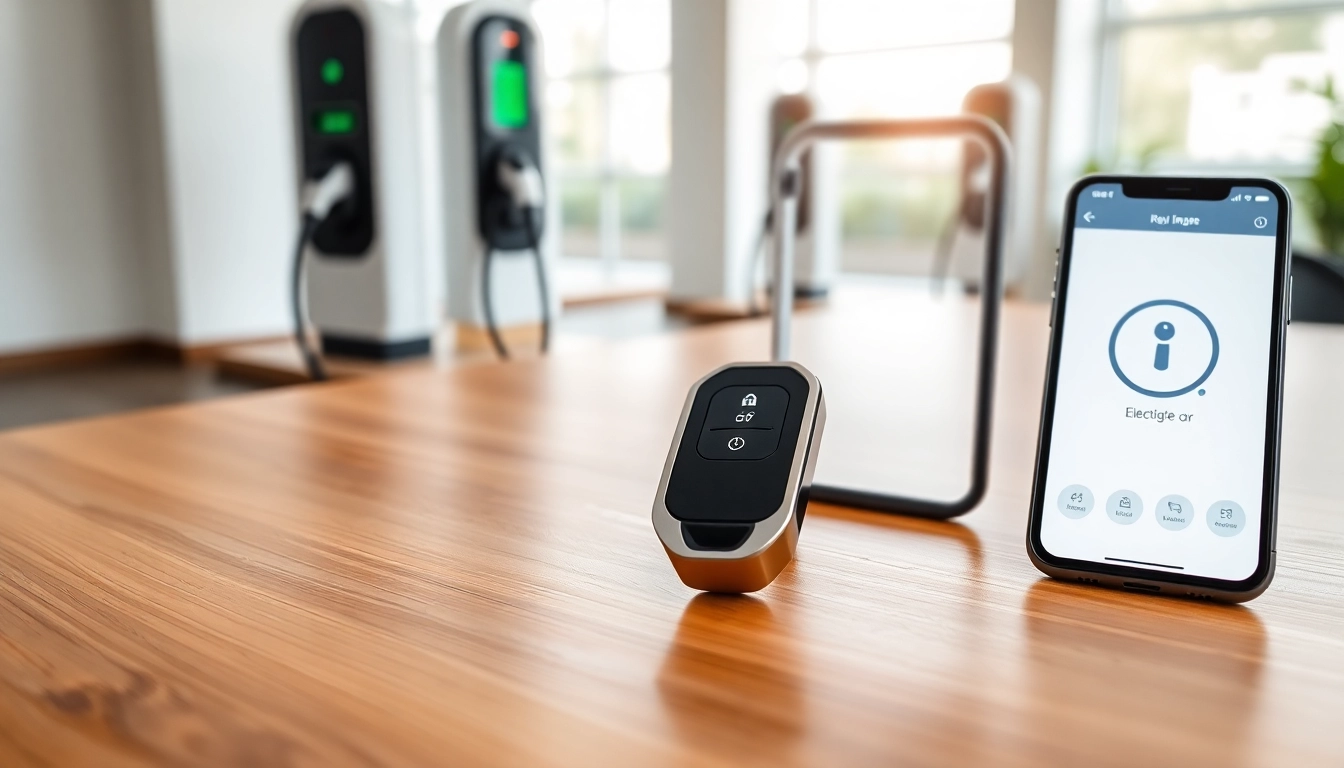Introduction to Keys for Electric Cars
As the automotive landscape evolves with the increasing popularity of electric vehicles (EVs), the technology surrounding vehicle access has also undergone significant transformations. Keys for electric cars are no longer just traditional metal objects; they are now sophisticated devices that incorporate technology designed for convenience, security, and integration with our digital lifestyle. Understanding how these keys function and their importance can greatly enhance the experience of owning an electric vehicle.
What Are Electric Car Keys?
Electric car keys come in various forms, including physical key fobs, NFC-enabled key cards, and smartphone applications. Unlike conventional keys that merely unlock doors, these modern keys often come with advanced functionalities. They might include features such as remote unlocking, starting the car from a distance, and even pre-conditioning the car’s interior temperature. Additionally, many electric car keys are equipped with electronic signal technologies, enhancing their security and user experience.
The Evolution of Car Keys: From Traditional to Digital
The transition from traditional metal keys to digital counterparts has been swift, paralleling the rise of technology in all aspects of life. Early automotive keys were straightforward devices used purely for mechanical access to the vehicle. As cars became more technologically advanced, keys evolved into electronic fobs, which could communicate wirelessly with the car. Today, with the advent of smartphones and mobile apps, many manufacturers offer keys that completely eliminate the need for physical devices. This evolution marks a significant shift towards integrated technology in our daily lives.
Why Keys for Electric Cars Matter
Understanding the nuances of keys for electric cars is essential for various reasons. First, they impact the daily convenience of car usage. The ease of unlocking and starting a vehicle contributes significantly to user satisfaction. Second, security features integrated into these keys help prevent vehicle theft. Finally, as vehicles adapt to technology trends, having a solid grasp of these keys allows users to maximize the full potential of their electric vehicles, tapping into features that make driving and vehicle management a seamless experience.
How Keys for Electric Cars Work
The mechanisms behind electric car keys are complex, involving a range of technologies to ensure they are not only effective but also secure. Let’s delve deeper into how they operate and what sets them apart.
Types of Keys for Electric Cars: Fob, Card, and Smartphone
There are three dominant forms of keys associated with electric vehicles: the key fob, the key card, and mobile applications. Each has its unique set of functionalities and uses.
- Key Fobs: These battery-operated devices allow users to unlock or start their cars without needing a physical key. Users can simply carry the fob in their pocket or purse. They often come with additional features like remote start, which lets owners precondition their car before entering.
- Key Cards: Many manufacturers offer key cards resembling credit cards that operate using near-field communication (NFC). This technology enables users to unlock their car by holding the card near a designated area on the vehicle.
- Smartphone Apps: As technology progresses, numerous electric vehicles now provide dedicated mobile applications that allow users to unlock, start, and control various functions of their cars remotely. Using Bluetooth or internet connectivity, these applications have become essential for a tech-savvy user base.
Programming and Security Features of Electric Car Keys
The security features of electric car keys have become more sophisticated over the years. Most modern car keys use a rolling code system, which changes the access code every time the key is used. This prevents unauthorized duplication. Furthermore, many keys also incorporate advanced encryption algorithms that make it nearly impossible for hackers to compromise the signal sent between the key and the vehicle.
Programming these keys can vary from one type to another. Key fobs might require specialized tools for programming, while key cards often come pre-configured, and smartphone apps may simply need the user’s credentials to operate.
Common Issues with Keys for Electric Cars and Their Solutions
Despite their advanced technology, users often encounter issues with electronic keys. Common problems include battery depletion, signal interference, or malfunctioning due to damage. Here are effective solutions:
- Battery Replacement: Key fobs and cards depend on batteries for operation. Regularly checking battery levels and replacing them promptly can prevent access issues.
- Signal Interference: Environments with a lot of electronic interference can hinder communication between the key and the vehicle. Parking your car away from sources of interference can help mitigate this problem.
- Physical Damage: Keys can be easily damaged. By investing in protective cases or designs that are more resilient, users can avoid costly replacements.
Buying and Replacing Keys for Electric Cars
The replacement process for electric car keys can be different from traditional keys, often involving detailed steps to ensure compatibility and security. Here’s what you need to know when navigating this process.
Where to Purchase Keys for Electric Cars
Keys for electric cars can be acquired through various channels. Dealerships typically offer replacements, though they may come at a premium cost. Online retailers also sell keys compatible with various models, providing users with an array of choices that may be more budget-friendly. Additionally, some independent locksmith services are beginning to specialize in electronic keys, offering effective alternatives for replacement and programming.
What to Consider When Replacing Your Car Key
When it comes to replacing keys for electric cars, it’s crucial to consider several factors:
- Compatibility: Ensure that the new key is compatible with your vehicle model. Check the specifications from your vehicle’s manufacturer.
- Programming Requirements: Some keys require special programming tools. Verify if your replacement requires professional programming or if it can be done independently.
- Cost: Evaluate the costs associated with purchasing the key, including potential programming fees. Comparing prices between different service providers can help find the best deal.
Cost Factors Associated with Keys for Electric Cars
The costs related to electric car keys can vary widely based on several factors. Initially, the type of key greatly influences the price. Basic fobs may be less expensive, while advanced smartphone integration keys will typically cost more. Programming and labor costs are additional considerations, particularly if visiting a dealership. Warranty coverage, if any, can also impact the overall expense. Aligning budget expectations with these factors can aid in making informed purchasing decisions.
Innovative Features of Keys for Electric Cars
As technology continues to advance, the functionality of electric car keys has also become more sophisticated, providing users with enhanced experiences and features.
Smart Keys vs. Traditional Keys: A Comparison
Smart keys stand out in contrast to traditional keys in numerous aspects:
- Convenience: Smart keys facilitate keyless entry, enabling the owner to unlock their car with a simple approach, whereas traditional keys require physical insertion into a lock.
- Functional Features: Many smart keys incorporate functionalities such as remote starting, vehicle tracking, and even alerting you if you leave the keys inside the car.
- Security: Smart keys usually have heightened security measures that can reduce the risk of theft compared to traditional keys.
How Digital Keys Enhance User Experience
Digital keys enhance user experience significantly by integrating with smartphone systems. They allow seamless vehicle operation without needing a physical key, which aligns with contemporary consumer preferences for smartphone-centric solutions. Users can access a suite of features like vehicle diagnostics, location tracking, and remote management capabilities from their devices. This streamlining reduces reliance on traditional methods, further appealing to tech-savvy consumers.
The Future of Keys for Electric Cars and Emerging Trends
As we look toward the future, keys for electric cars will likely continue evolving to incorporate newer technologies such as biometric security and further integration with smart home systems. Emerging trends suggest an increasing reliance on mobile and cloud-based solutions, potentially offering features such as enabling remote sharing of vehicle access and enhanced vehicle management functions. The drive toward more sustainable and efficient automotive technologies will also play a significant role in shaping the next generation of keys.
Practical Tips for Using Keys for Electric Cars
To ensure users get the most from their electric vehicle keys, following some practical tips can make a significant difference.
Best Practices for Maintaining Your Electric Car Key
- Regular Checks: Periodically inspect your key for signs of damage or battery issues. Early detection can prevent major inconveniences later.
- Proper Storage: Keep keys in a designated spot to minimize the risk of loss or damage. Avoid leaving them near devices that could cause signal interference.
- Update Software: If using a smartphone app, ensure the application is regularly updated to take advantage of new features and security enhancements.
How to Maximize the Features of Your Electric Car Key
To optimize the use of your electric car key, familiarize yourself with its complete range of features. Often, owners may be unaware of the full scope of functionalities available to them, such as pre-conditioning interiors or engaging security alerts. Reviewing the vehicle manual and exploring app features can uncover capabilities that enhance the driving experience significantly.
FAQs About Keys for Electric Cars
Here are some frequently asked questions regarding keys for electric cars, which can clarify any concerns potential users might have:
- Can I replace my electric car key on my own? While some keys may allow for DIY replacements, many require specific programming that is typically done by professionals.
- What should I do if my key is lost or damaged? Contact your dealership or an authorized service provider for assistance in replacing a lost or damaged key.
- Are electric car keys waterproof? Most smart keys possess some level of water resistance, but it’s advisable to avoid exposing them to excessive moisture.



